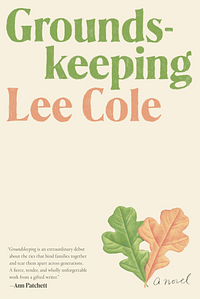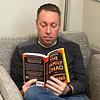You need to sign in or sign up before continuing.
Take a photo of a barcode or cover
emotional
funny
reflective
medium-paced
Plot or Character Driven:
Character
Strong character development:
Complicated
Loveable characters:
Complicated
Diverse cast of characters:
Yes
Flaws of characters a main focus:
Yes
This book is awful and frought with geographical inconsistencies that make it difficult to read. The author spends more time trying to prove their knowledge of Louisville than developing a story.
First appeared at https://www.thenewdorkreviewofbooks.com/2022/03/groundskeeping-by-lee-cole-love-is.html
Fair warning to take this absolutely glowing review with just the tiniest grain of salt. That's because Lee Cole's debut novel Groundskeeping is an absolute wheelhouse book for me, so there's almost no chance I wasn't going to love it. And love it, I did!
It's a campus novel. It's a love story. It's an examination of class and politics. It's a look at how writers are inspired to write what they write. And it's all narrated by a guy from a small conservative rural town trying to punch his way up in the world. Yeah, there's a lot going on here, but it works. Cole is a deeply astute writer and all these ingredients of story combine to create a richly satisfying dish.
The story is this: Owen is 28 and drifting. He lives in this rural Kentucky town with his grandfather and Uncle Cort and works as a groundskeeper at the local small college. Still with aspirations of being a writer after crashing and drifting a bit, the job allows him to take an English class, a first step to getting his life back on track. Then, he meets Alma, 26, an already medium-successful poet and novelist who is a writer-in-residence for the year at the college. Sparks fly!
But Alma's background -- her parents emigrated from Bosnia to escape the war when she young, she's a Muslim though non-practicing, and she attended Princeton -- is very different from Owen's. Owen's parents, though he's mildly estranged from both (hence why he's living with his grandfather) are both divorced and remarried, both evangelical Christians, and very conservative. Alma's parents, immigrants, doctors, well-educated, are...not those things. They're two families, both alike in dignity, but both skeptical of their children's choice of partner.
The story is set in 2016 and all around Owen's and Alma's rural Kentucky town, Trump is ascendent. Though Owen and Alma are both appalled by this development, their different backgrounds create its own tension. Owen has a mild inferiority complex, always wondering if Alma looks down on him, and bristles when she ask him about things like his past drug use, etc. Even in (or especially in?) this day and age, can two people from such different origins make it work?
As I read, I felt about this book about how I feel about all books I'm connecting with. I didn't want it to end. In fact. let's let Cole himself explain what this is like (in the context of Owen meeting Alma for the first time):
“I felt the competing desires, as I often did when meeting someone new, to know everything at once and to save it all for later. It was like the feeling one has reading a good book, the sensation of being propelled toward the end and at the same time wishing to linger.”
That's not a particularly original sentiment, I realize. But just the way Cole writes these sentences illustrates that point so clearly and deftly. It's a good representation of his style, his perceptiveness, and why I loved reading this.
This novel first arrived on my radar when I noticed blurbs from both Ann Patchett and Richard Russo, two of my all-time favorite writers. So naturally I was going to check it out. If you are one of the many people, like me, who was disappointed by the latest Sally Rooney novel, try this one instead. The feel is similar, but this is so much better.
Fair warning to take this absolutely glowing review with just the tiniest grain of salt. That's because Lee Cole's debut novel Groundskeeping is an absolute wheelhouse book for me, so there's almost no chance I wasn't going to love it. And love it, I did!
It's a campus novel. It's a love story. It's an examination of class and politics. It's a look at how writers are inspired to write what they write. And it's all narrated by a guy from a small conservative rural town trying to punch his way up in the world. Yeah, there's a lot going on here, but it works. Cole is a deeply astute writer and all these ingredients of story combine to create a richly satisfying dish.
The story is this: Owen is 28 and drifting. He lives in this rural Kentucky town with his grandfather and Uncle Cort and works as a groundskeeper at the local small college. Still with aspirations of being a writer after crashing and drifting a bit, the job allows him to take an English class, a first step to getting his life back on track. Then, he meets Alma, 26, an already medium-successful poet and novelist who is a writer-in-residence for the year at the college. Sparks fly!
But Alma's background -- her parents emigrated from Bosnia to escape the war when she young, she's a Muslim though non-practicing, and she attended Princeton -- is very different from Owen's. Owen's parents, though he's mildly estranged from both (hence why he's living with his grandfather) are both divorced and remarried, both evangelical Christians, and very conservative. Alma's parents, immigrants, doctors, well-educated, are...not those things. They're two families, both alike in dignity, but both skeptical of their children's choice of partner.
The story is set in 2016 and all around Owen's and Alma's rural Kentucky town, Trump is ascendent. Though Owen and Alma are both appalled by this development, their different backgrounds create its own tension. Owen has a mild inferiority complex, always wondering if Alma looks down on him, and bristles when she ask him about things like his past drug use, etc. Even in (or especially in?) this day and age, can two people from such different origins make it work?
As I read, I felt about this book about how I feel about all books I'm connecting with. I didn't want it to end. In fact. let's let Cole himself explain what this is like (in the context of Owen meeting Alma for the first time):
“I felt the competing desires, as I often did when meeting someone new, to know everything at once and to save it all for later. It was like the feeling one has reading a good book, the sensation of being propelled toward the end and at the same time wishing to linger.”
That's not a particularly original sentiment, I realize. But just the way Cole writes these sentences illustrates that point so clearly and deftly. It's a good representation of his style, his perceptiveness, and why I loved reading this.
This novel first arrived on my radar when I noticed blurbs from both Ann Patchett and Richard Russo, two of my all-time favorite writers. So naturally I was going to check it out. If you are one of the many people, like me, who was disappointed by the latest Sally Rooney novel, try this one instead. The feel is similar, but this is so much better.
I read this for my book club. It had been on a few of our lists. I’m not sure I would have finished it if not for book club. The writing is engaging enough that I was able to read stay into it, but not a lot happens. This is a bit of a coming of age story of a man who is nearly 30. As a woman who has long had her shit together (thanks to enormous privilege, no doubt), I did not relate to our protagonist. I do think it’s incredible he forged a new path away from his earlier difficulties, but that isn’t the story or focus at all (and his gal certainly doesn’t see it that way—he has to comfort *her* about his difficult past).
Everything is copy, but also he’s a baby man who took advantage of private moments.
Everything is copy, but also he’s a baby man who took advantage of private moments.
Well. I ended up enjoying the book more than I expected to. Reading a novel about an MFA student trying to write fiction was a bit too self-conscious at times, but the ending it pulled off was believable; I’m glad it didn’t try to tie everything together neatly.
I’m not sure what to make of this book.
What I liked.
- Owen was sympathetic toward the people who voted for Donald Trump, although he disagreed with them.
- Owen/Cole highlighted the hypocrisy of people with “liberal” ideals.
- The granddad!
What I did not like.
- Bah. It read like a writing project for school, not a published novel. I understand that blurring the boundaries between the writer, the character, and the reader was the point, but it was too much like Cole was saying, “Look at me! Aren’t I clever!”
- The flashing neon foreshadowing and metaphors.
- I hated the romance. It was like watching Anakin flirt with Padmé without cool lightsaber battles with droids to break up the eye-rolling, and Anakin was 16, and this dude is pushing 30.
- There were two major events in the book for Owen, and I do not think he faced consequences for them. The lack of consequences happens in real life, but if Cole puts an event in a book, it should have a follow-through. People shouldn’t just move on.
What I liked.
- Owen was sympathetic toward the people who voted for Donald Trump, although he disagreed with them.
- Owen/Cole highlighted the hypocrisy of people with “liberal” ideals.
- The granddad!
What I did not like.
- Bah. It read like a writing project for school, not a published novel. I understand that blurring the boundaries between the writer, the character, and the reader was the point, but it was too much like Cole was saying, “Look at me! Aren’t I clever!”
- The flashing neon foreshadowing and metaphors.
- I hated the romance. It was like watching Anakin flirt with Padmé without cool lightsaber battles with droids to break up the eye-rolling, and Anakin was 16, and this dude is pushing 30.
- There were two major events in the book for Owen, and I do not think he faced consequences for them. The lack of consequences happens in real life, but if Cole puts an event in a book, it should have a follow-through. People shouldn’t just move on.
I picked this book up on a whim, drawn to the beautiful, minimalist cover. I am so happy I did.
Set in rural Kentucky in the days leading up to and months following the 2016 election, this debut novel tells the story of Owen. Owen is a character so beautifully written, I won’t soon forget him. Or Pop, whom I loved very much. This is a comfort read — perfect for early spring or late fall. I was happy I read it when I did because I can’t believe that it would have had the same effect on me if I’d have read it in the summer.
The story was slow paced, told in shorter jolts of several paragraphs at a time (there are no chapter designations, there is a part 1 and a part 2). Going through it, you would think that there was no overarching plot, that it was just Owen’s life from August 2016 to spring of 2017. But in the last 20 pages there is a climax and a resolution. Typically I dislike when novels do this, I always think the resolution is rushed and hurried. But this worked beautifully. The ending is left quite open, and I will daydream about Owen for days to come surely.
The only downfall I can think of is that the ugly “Read with Jenna” bubble isn’t a sticker on this one. It’s printed on it and thus will be a boil on the beautiful cover forever. Maybe in future printings it will no longer adorn and I can donate this copy and buy a prettier one. I can hope.
Set in rural Kentucky in the days leading up to and months following the 2016 election, this debut novel tells the story of Owen. Owen is a character so beautifully written, I won’t soon forget him. Or Pop, whom I loved very much. This is a comfort read — perfect for early spring or late fall. I was happy I read it when I did because I can’t believe that it would have had the same effect on me if I’d have read it in the summer.
The story was slow paced, told in shorter jolts of several paragraphs at a time (there are no chapter designations, there is a part 1 and a part 2). Going through it, you would think that there was no overarching plot, that it was just Owen’s life from August 2016 to spring of 2017. But in the last 20 pages there is a climax and a resolution. Typically I dislike when novels do this, I always think the resolution is rushed and hurried. But this worked beautifully. The ending is left quite open, and I will daydream about Owen for days to come surely.
The only downfall I can think of is that the ugly “Read with Jenna” bubble isn’t a sticker on this one. It’s printed on it and thus will be a boil on the beautiful cover forever. Maybe in future printings it will no longer adorn and I can donate this copy and buy a prettier one. I can hope.
Lots to like here, I will be interested to read his next book. Details are great. There’s a lot of unevenness in the story - drags sometimes, leaps ahead others…and I hated the protagonist. Probably 3.5 stars but I think his next book could be great.
A slow start but well written and thought provoking.
This was more like a 3.5. I did enjoy it for the most part. I liked the second half of the novel better than the first, the second half delved into the family/political/class dynamics of the two characters more. I was not a fan of the no quotation marks writing style. If you are looking for major plot developments, this is not the book for you.





